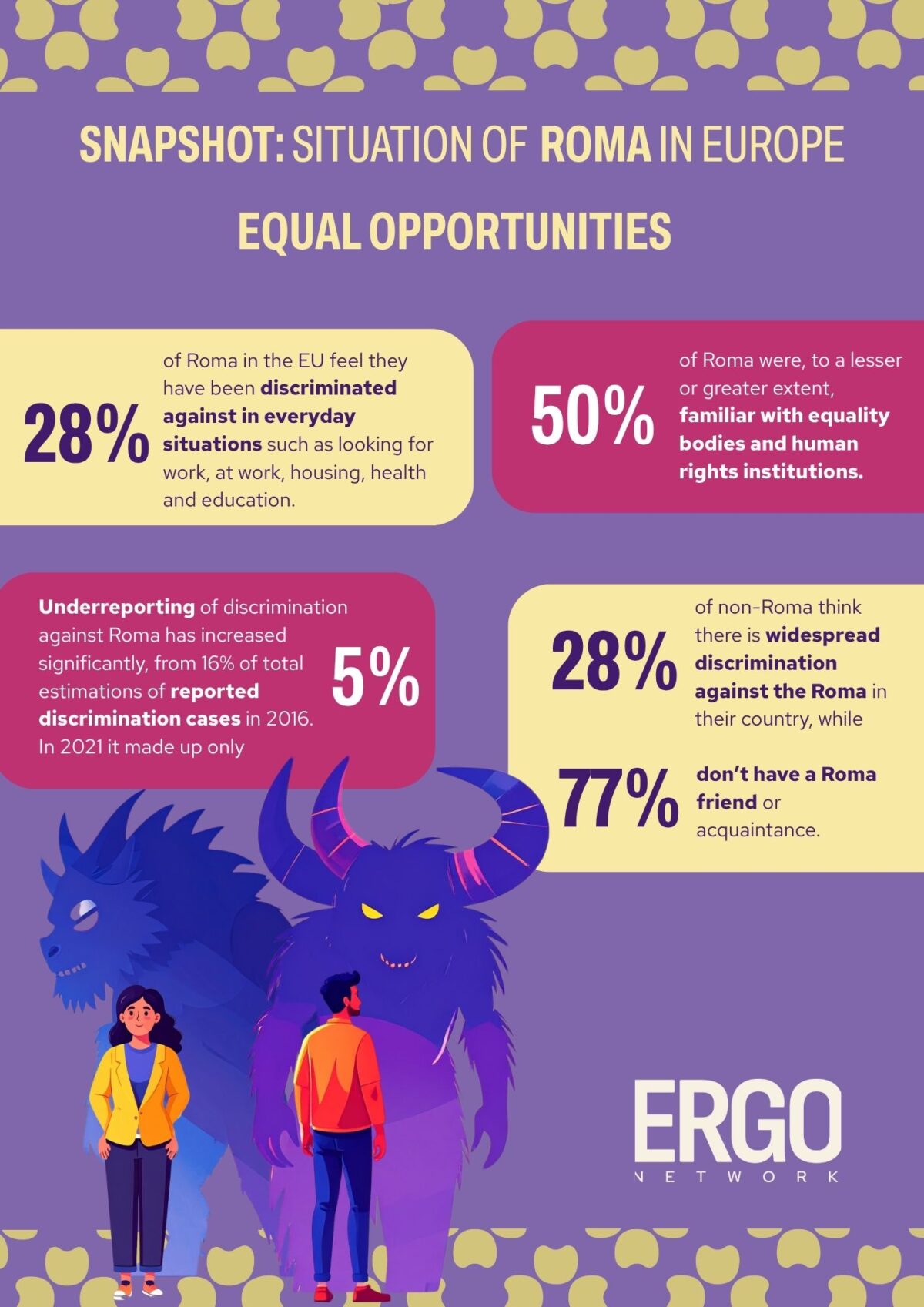How to ensure that the European Pillar of Social Rights delivers on Roma equality, inclusion, and participation?
ERGO Network responds to the European Commission public consultation on the Social Pillar Action Plan
In 2017, the European Union broke new ground by adopting the European Pillar of Social Rights (Social Pillar), the first set of social rights proclaimed by EU institutions since the Charter of Fundamental Rights in the year 2000. While not legally binding, this comprehensive initiative of 20 social policy principles, complemented by a Social Scoreboard of 14 indicators, aims at supporting well-functioning and fair labour markets and welfare systems, with a focus on better integrating and delivering on social concerns. The European Commission has pledged to make the Social Pillar “the compass of Europe’s recovery and our best tool to ensuring no one is left behind”, so that Europe’s future is socially fair and just.
ERGO Network has prepared a comprehensive response to the public consultation launched by the European Commission this year, with a view to prepare an Action Plan for the Implementation of the Social Pillar, announced for 2021. In it, we set out our analysis and policy recommendations for each of the 20 principles of the Social Pillar, to ensure that its implementation specifically includes the Roma and that meaningful interplay is sought with the EU Strategic Framework for Roma Equality, Inclusion, and Participation.
Access ERGO Network’s consultation response.
While it is a crucial framework document for EU social policy, the Social Pillar is not a strategy per se, as it lacks measurable targets. The Social Scoreboard does not measure progress towards ambitious objectives, but simply maps Europe in terms of best and worst performers compared to EU averages. The process needs to be reformed so that the Scoreboard brings about concrete policy triggers for change. At the moment, the 14 indicatorsdo not fully correspond to, nor completely reflect, the 20 policy principles. Additionally, indicators under the Social Scoreboard should be disaggregated to include data on key groups, such as the Roma, and also be aligned with the measuring undertaken under the National Roma Strategic Frameworks, to ensure a coherent approach.
Delivery on the EU Strategic Framework for Roma Equality, Participation, and Inclusion must be fully integrated in the European Semester and other key social processes, such as the European Pillar of Social Rights and the Sustainable Development Goals. These must be mutually reinforcing. Unfortunately, the EU Roma Strategic Framework targets makes few specific links to the Social Pillar and its 20 principles, and a footnote even reduces the scope to only 3 principles. The Framework Communication does not mention that the Pillar will also contribute to implementing the Roma Framework – only the other way around. Additionally, it is crucial that the Social Pillar Action Plan itself is placed at the heart of the European Semester processes, including the new focus on the Recovery and Resilience Facility and the assessment of National Plans to that effect.
The fight against racism and discrimination in all its forms, including antigypsyism, must be a key element of the Social Pillar Action Plan, both in itself (under Principle 3), as well as in a cross-cutting manner across the remaining principles, to ensure that Roma in Europe can access employment, education, health, housing, and social protection. The Action Plan must take full account of other important EU initiatives, such as the Action Plan Against Racism 2020-2024, the LGBTIQ Equality Strategy, the New Pact on Migration and Asylum, the Race Equality Directive (RED), Victims’ Rights Directive, Employment Equality and Recast Directives, Framework Decision against Racism, Charter for Fundamental Rights, as well as the OSCE Action Plan for Roma and Sinti and the Council of Europe Roma and Travellers Action Plan.
With Europe 2020 coming to an end, there is currently no European strategy to combat poverty and social exclusion. Encouragingly, the new EU Roma Strategic Framework contains an explicit cross-cutting priority objective, with concrete targets, to reduce Roma poverty. The Social Pillar Action Plan must reflect this commitment for all groups across the European Union, and embed a strong anti-poverty dimension, combined with an ambitious EU-wide poverty-reduction target.
The implementation of the Social Pillar and its Action Plan remain contingent on the availability of necessary financial resources to deliver on the commitments made. Recovery packages (NextGenEU, the Recovery and Resilience Facility, InvestEU and ReactEU) and the next programming period 2021-2027 will play a key role. The European Commission must ensure that mainstream funding reaches the Roma. Clear guidelines must be given to Governments and Managing Authorities to make sure allocations are made for the vulnerable and Roma especially – including through a corresponding enabling condition and Roma-specific indicator, aligned with the National Roma Strategic Frameworks. The Partnership Principle must be reinforced and applied.
Finally, the Social Pillar Action Plan will only be effective if it achieves wide ownership by beneficiaries, if it is rooted in direct evidence from the ground, and if its delivery is underpinned by a comprehensive and meaningful partnership of all stakeholders. Roma communities and their NGO representatives must be involved at all stages in the design, delivery, and monitoring of measures, at both national and EU level. Clear dialogue and cooperation protocols need to be put in place, to ensure that the voice of marginalised communities is heard and taken into account, while necessary financial resources need to be made available to support Roma NGOs and build awareness, participation, and active citizenship, as well as more resilient democracies.
We are looking forward to the European Commission’s proposal for the Action Plan on the European Pillar of Social Rights, and hope to see our key concerns reflected!
For more information about ERGO Network’s work on EU social inclusion and employment policy (European Semester, European Pillar of Social Rights, Sustainable Development Goals etc), please contact Senior Policy Adviser Amana Ferro.






